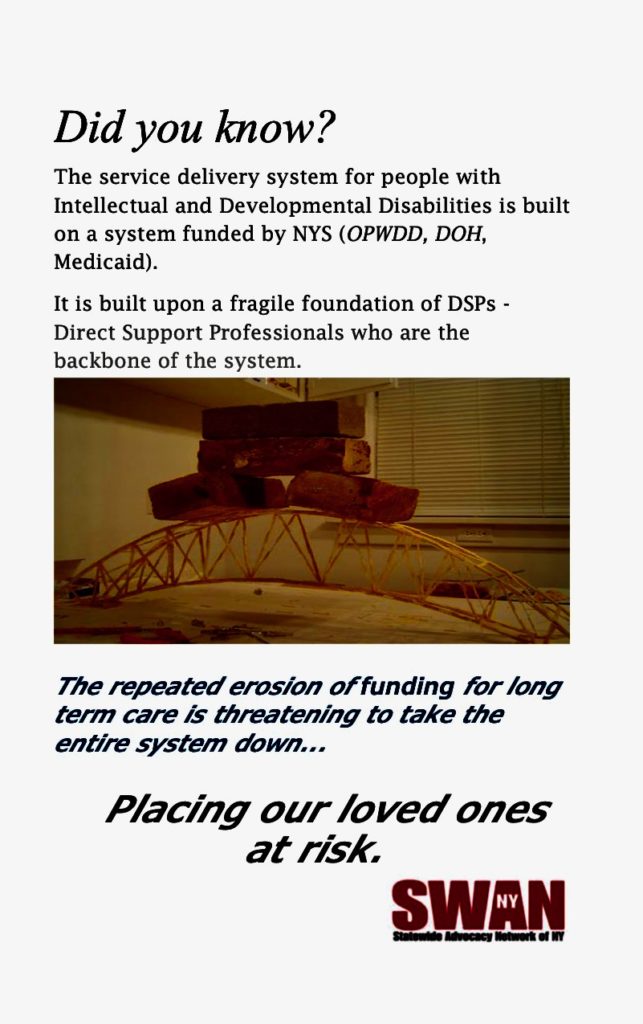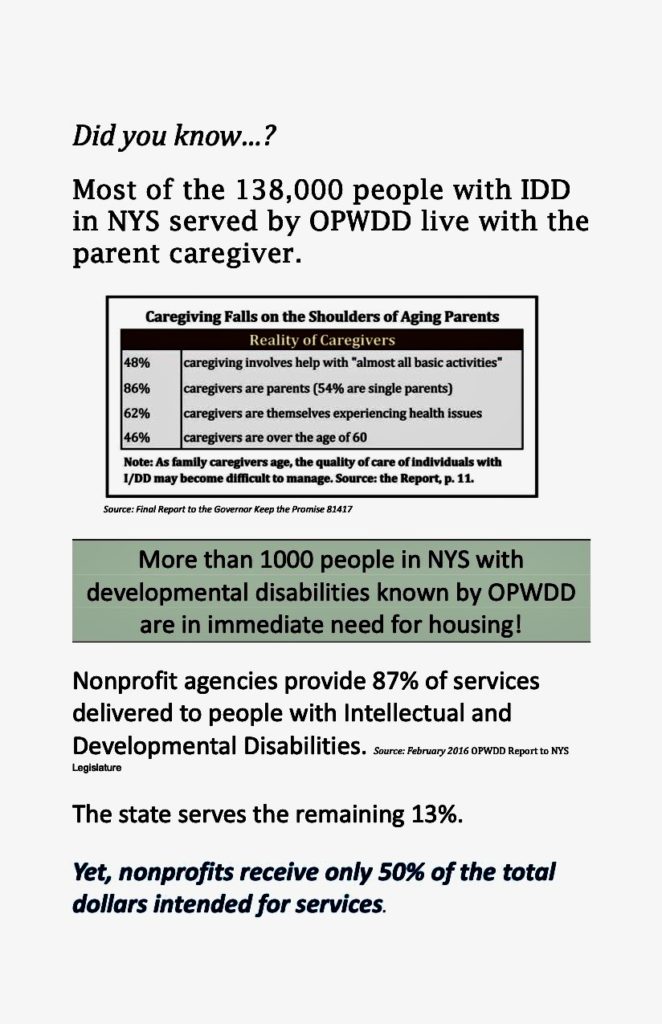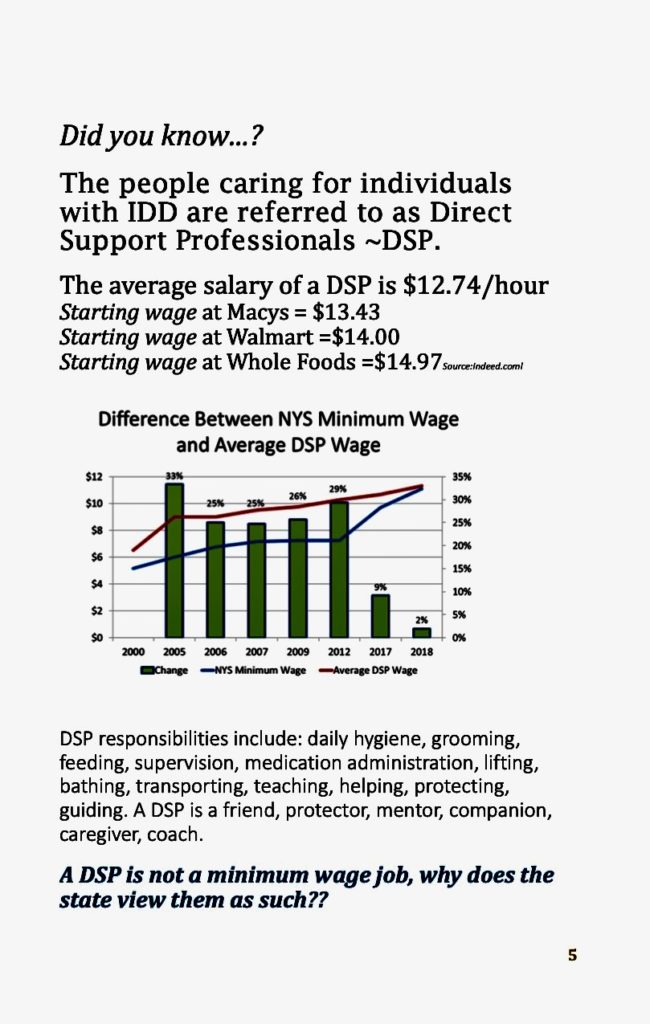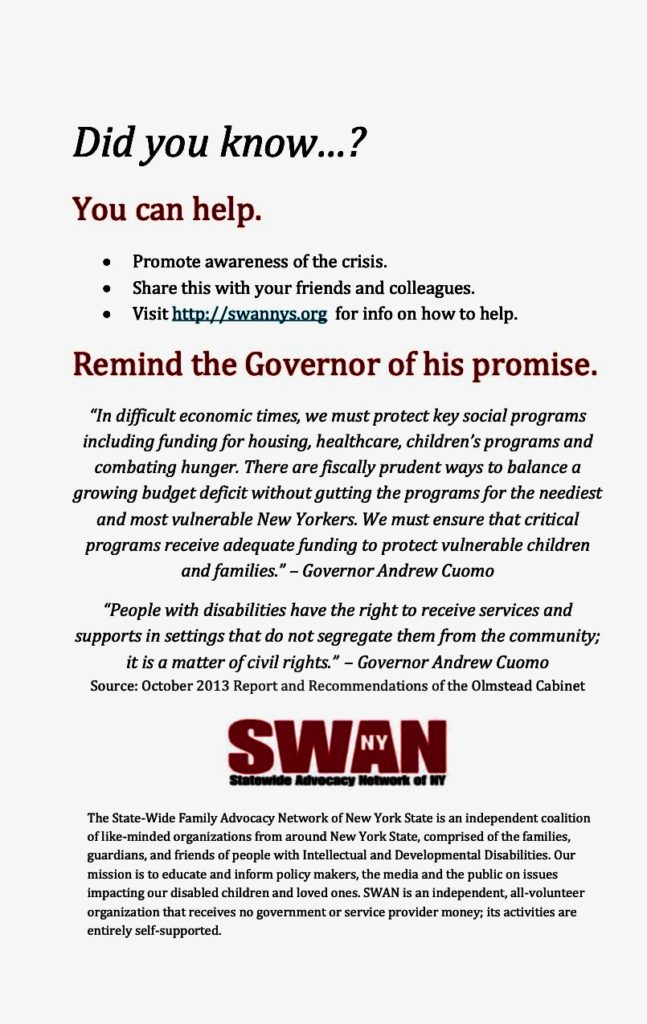SWAN April 19 2018 mtg with OPWDD
Meeting held on April 19, 2018
Attendees: OPWDD – Acting Commissioner Kerry Delaney, JoAnn Lamphere, Jay Kiyonga, Kate Bishop, Neil Mitchell, Meagan O’Conner, Greg Roberts,
SWAN: Brad Pivar, Pat Curran, Kathy Bunce*, Jim Karpe*, Meri Krassner*, Roy Probeyan*, Fran Kermian*, Dan Maillet* (*via teleconference)
Meeting held on April 19, 2018
Attendees: OPWDD – Acting Commissioner Kerry Delaney, JoAnn Lamphere, Jay Kiyonga, Kate Bishop, Neil Mitchell, Meagan O’Conner, Greg Roberts,
SWAN: Brad Pivar, Pat Curran, Kathy Bunce*, Jim Karpe*, Meri Krassner*, Roy Probeyan*, Fran Kermian*, Dan Maillet* (*via teleconference)
Update on open action items:
- SWAN appreciates being a part of the workgroups and looks forward to continued active participation. Kerry Delaney will continue to involve families in policy, messaging, and governance. This will be a continued and ongoing objective.
- Discussion regarding road map to Managed Care. OPWDD suggested that SWAN review what is available on website in terms key steps and target dates and provide any feedback/questions to OPWDD. Also blueprint document is in process and they expect it to be posted sometime in August. Involvement will initially be voluntary and will move to mandatory at some point. Jim Karpe suggested that a topic for our next discussion be regarding what they envision managed care to look like for the I/DD world. JoAnn suggested that a prerequisite be for SWAN to review the Transition document available on the website.
- Brad Pivar has established ongoing communication with the Justice Center and has provided the Justice Center with focal points from each family group to facilitate involvement and local meetings. In addition the next SWAN meeting with Justice Center will be scheduled in combination with other meetings in Albany.
- Still waiting for additional information on ABLE tax credit policies from Paul Francis’ office. SWAN will follow up with Shelly.
- SWAN will follow up with Shelly W regarding her offer to set up meeting with new Medicaid Director
- Great progress in communication with DOH regarding MAPP. SWAN white paper provided to DOH & OPWDD identifying key requirements. Follow up meeting occurred 2 weeks ago and good progress has been made toward first two priorities. By 4/27 we hope to know what the MAPP template will look like. JoAnn emphasized that the 27th is a tentative date and reminded us of the “crawl, walk,run” discussion. It was also pointed out that not all data will be available until the CCO’s are up and running.
New Business:
- Staffing
- Discussion regarding the loss of several key people at some of the regional offices. There is considerable concern relating to the loss of deep institutional knowledge as the “baby boomers” are retiring. Kerry shared that the turnover in the last five years is unprecedented and they expect it will continue for another 5 to 10 years. They agree it is a major and critical issue. Succession planning is important and will continue. OPWDD acknowledged that it took over a year to identify the right person to replace Donna Limiti. (with Mary Grace Guiliano) Their focus is to keep the day to day operations up and going. OPWDD urges SWAN to bring any specific concerns to Meaghan and Abiba..
- SWAN offered their support to provide advocacy to the “2nd floor” as to the importance of OPWDD and the value they can provide. It was acknowledged that the budget reflects a 32 position decrease. Kerry shared that a majority of those positions have been in central office so the regions can continue to serve individuals. She indicated that these type cuts can often be dealt with without significant impact as they align divisions, seek synergy, etc. Jay indicated that whereas they hate to see any cuts at all, they are pleased that everything else in the budget was position and OPWDD received $120MM of new money.
- Brad P. shared that participation in self direction has doubled, however the department has not grown accordingly. OPWDD indicated they would be happy to discuss further… Dixie (OPWDD) indicated that there has been grown in the SD staff in LI regional office
- Coordinated Assessment System (CAS)
- SWAN shared that there is significant angst among families across the state with the CAS and particularly around the appeal process (or lack thereof) The website doesn’t seem to have any information that is current that could help inform individuals/families. It was also communicated that it doesn’t appear that the MSC understands what is expected of them and can answer the detailed questions that families have. Is there a work process flow as well as a Role Clarity chart available? It was suggested that if loved ones of SWAN steering committee members were assessed, there would be first-hand knowledge that we could share and help to improve and communicate to others.
- Kate Bishop acknowledged the concerns and shared that they have been conducting a lot of MSC education. Further, she indicated that they have a “quality review” process and not an “appeal” process and there is no time limitation on this. They did conduct a 100 person survey to see if the process was working. Almost 50% said the process had been followed. There is a written document to that provides the output. SWAN indicated that they are hearing that the output is terribly difficult to understand. OPWDD understands that there needs to be improvement and that they have created a guidance document to understand how to interpret the output. Also included is how the CAS interfaces with the person centered planning process. As it relates to SWAN participating In the assessment, Kate indicated that that may be a possibility Barb D. will submit names of willing steering team members to Kate.
- JoAnn indicated that stakeholder advisory groups have been helping along the way. They understand how critical it is to get it all done properly. When there are problems, they are evaluating, is it the process, or the interpretation or not having the right people.
- Jay indicated that OPWDD has informed CMS that the CAS will be used to set residential rates in July 2019. SWAN indicated the urgency to get it right.
- Additional discussion regarding how families and individuals are informed about the feedback loop, the quality review process and how to confirm the results are a true reflection of their loved ones need and abilities. OPWDD is working on improving the website to provide increased knowledge. However, communication must occur that it exists.
- JoAnn indicated that as they work thru improving information on the website, that families start with their MSC and then direct their concerns to Diane Woodward and Kate Bishop.
- .CCOs
- SWAN shared that all family groups have been hosting meetings with the CCO’s in that region presenting. All family groups have been also distributing the OPWDD schedule for public session and encouraging family members to attend. We will continue to host CCO’s at our meetings.
- Pat C. indicated that many families do not have the time to go to these public forums. OPWDD shared they would be posted a recorded forum to their website They are also relying heavily on the MSC’s to communicate the message since they are the primary conduit of information. However, SWAN indicated that many times the MSC’s know less than we do.
- Kate shared that lots of information was sent out to MSCs. One of the challenges is that there are 400 different organizations with different levels of competency. The move to CCOs will help empower the Care Manager and it will be easier to communicate when they have a smaller caseload
- Internal discussions have been robust with many concerns, confusion and fear. Some families have indicated they are not receiving a standardized message
- The written material provided by OPWDD and the brochure were well received. The “chart” was particularly helpful.
- Kerry indicated that there are a number of protection and continuity of care provisions. She emphasized that the goal of CCO’s are not to decrease level of service.
- OPWDD indicated that any MCO will need to have a very broad network
- Barb D suggested we have another discussion in 4 to 6 weeks as CCO “go live” gets closer. Jay emphasized that if critical issues come up in the meantime to reach out sooner
.
Dated: 4/30/2018
- SWAN appreciates being a part of the workgroups and looks forward to continued active participation. Kerry Delaney will continue to involve families in policy, messaging, and governance. This will be a continued and ongoing objective.
- Discussion regarding road map to Managed Care. OPWDD suggested that SWAN review what is available on website in terms key steps and target dates and provide any feedback/questions to OPWDD. Also blueprint document is in process and they expect it to be posted sometime in August. Involvement will initially be voluntary and will move to mandatory at some point. Jim Karpe suggested that a topic for our next discussion be regarding what they envision managed care to look like for the I/DD world. JoAnn suggested that a prerequisite be for SWAN to review the Transition document available on the website.
- Brad Pivar has established ongoing communication with the Justice Center and has provided the Justice Center with focal points from each family group to facilitate involvement and local meetings. In addition the next SWAN meeting with Justice Center will be scheduled in combination with other meetings in Albany.
- Still waiting for additional information on ABLE tax credit policies from Paul Francis’ office. SWAN will follow up with Shelly.
- SWAN will follow up with Shelly W regarding her offer to set up meeting with new Medicaid Director
- Great progress in communication with DOH regarding MAPP. SWAN white paper provided to DOH & OPWDD identifying key requirements. Follow up meeting occurred 2 weeks ago and good progress has been made toward first two priorities. By 4/27 we hope to know what the MAPP template will look like. JoAnn emphasized that the 27th is a tentative date and reminded us of the “crawl, walk,run” discussion. It was also pointed out that not all data will be available until the CCO’s are up and running.
New Business:
- Staffing
- Discussion regarding the loss of several key people at some of the regional offices. There is considerable concern relating to the loss of deep institutional knowledge as the “baby boomers” are retiring. Kerry shared that the turnover in the last five years is unprecedented and they expect it will continue for another 5 to 10 years. They agree it is a major and critical issue. Succession planning is important and will continue. OPWDD acknowledged that it took over a year to identify the right person to replace Donna Limiti. (with Mary Grace Guiliano) Their focus is to keep the day to day operations up and going. OPWDD urges SWAN to bring any specific concerns to Meaghan and Abiba..
- SWAN offered their support to provide advocacy to the “2nd floor” as to the importance of OPWDD and the value they can provide. It was acknowledged that the budget reflects a 32 position decrease. Kerry shared that a majority of those positions have been in central office so the regions can continue to serve individuals. She indicated that these type cuts can often be dealt with without significant impact as they align divisions, seek synergy, etc. Jay indicated that whereas they hate to see any cuts at all, they are pleased that everything else in the budget was position and OPWDD received $120MM of new money.
- Brad P. shared that participation in self direction has doubled, however the department has not grown accordingly. OPWDD indicated they would be happy to discuss further… Dixie (OPWDD) indicated that there has been grown in the SD staff in LI regional office
- Coordinated Assessment System (CAS)
- SWAN shared that there is significant angst among families across the state with the CAS and particularly around the appeal process (or lack thereof) The website doesn’t seem to have any information that is current that could help inform individuals/families. It was also communicated that it doesn’t appear that the MSC understands what is expected of them and can answer the detailed questions that families have. Is there a work process flow as well as a Role Clarity chart available? It was suggested that if loved ones of SWAN steering committee members were assessed, there would be first-hand knowledge that we could share and help to improve and communicate to others.
- Kate Bishop acknowledged the concerns and shared that they have been conducting a lot of MSC education. Further, she indicated that they have a “quality review” process and not an “appeal” process and there is no time limitation on this. They did conduct a 100 person survey to see if the process was working. Almost 50% said the process had been followed. There is a written document to that provides the output. SWAN indicated that they are hearing that the output is terribly difficult to understand. OPWDD understands that there needs to be improvement and that they have created a guidance document to understand how to interpret the output. Also included is how the CAS interfaces with the person centered planning process. As it relates to SWAN participating In the assessment, Kate indicated that that may be a possibility Barb D. will submit names of willing steering team members to Kate.
- JoAnn indicated that stakeholder advisory groups have been helping along the way. They understand how critical it is to get it all done properly. When there are problems, they are evaluating, is it the process, or the interpretation or not having the right people.
- Jay indicated that OPWDD has informed CMS that the CAS will be used to set residential rates in July 2019. SWAN indicated the urgency to get it right.
- Additional discussion regarding how families and individuals are informed about the feedback loop, the quality review process and how to confirm the results are a true reflection of their loved ones need and abilities. OPWDD is working on improving the website to provide increased knowledge. However, communication must occur that it exists.
- JoAnn indicated that as they work thru improving information on the website, that families start with their MSC and then direct their concerns to Diane Woodward and Kate Bishop.
- .CCOs
- SWAN shared that all family groups have been hosting meetings with the CCO’s in that region presenting. All family groups have been also distributing the OPWDD schedule for public session and encouraging family members to attend. We will continue to host CCO’s at our meetings.
- Pat C. indicated that many families do not have the time to go to these public forums. OPWDD shared they would be posted a recorded forum to their website They are also relying heavily on the MSC’s to communicate the message since they are the primary conduit of information. However, SWAN indicated that many times the MSC’s know less than we do.
- Kate shared that lots of information was sent out to MSCs. One of the challenges is that there are 400 different organizations with different levels of competency. The move to CCOs will help empower the Care Manager and it will be easier to communicate when they have a smaller caseload
- Internal discussions have been robust with many concerns, confusion and fear. Some families have indicated they are not receiving a standardized message
- The written material provided by OPWDD and the brochure were well received. The “chart” was particularly helpful.
- Kerry indicated that there are a number of protection and continuity of care provisions. She emphasized that the goal of CCO’s are not to decrease level of service.
- OPWDD indicated that any MCO will need to have a very broad network
- Barb D suggested we have another discussion in 4 to 6 weeks as CCO “go live” gets closer. Jay emphasized that if critical issues come up in the meantime to reach out sooner
.
Dated: 4/30/2018



